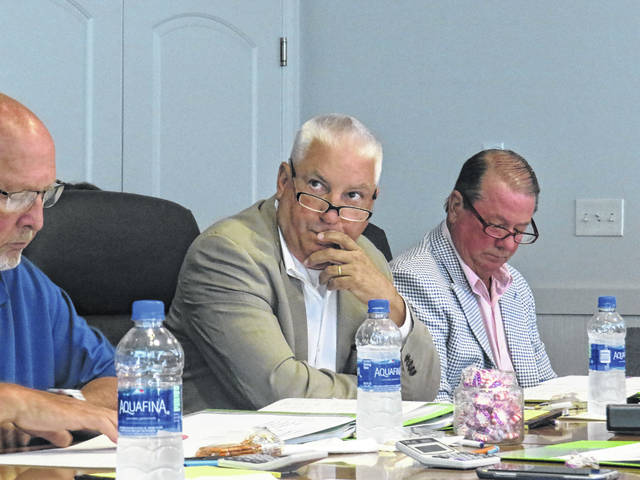ROCKINGHAM — The Richmond County Board of Commissioners on Tuesday approved its budget for the 2019-2020 fiscal year which sets the county in a positive direction on some fronts, like avoiding new tax increases and balancing the budget without dipping into the fund balance — the first time that’s been done since 1995 — while some negative trends continued which have again drawn the ire of state regulators.
The new budget continues the practice of using enterprise funds to boost the general fund, which County Manager Bryan Land noted in his budget message is an “unsustainable habit.” An enterprise fund is one that is self-sustaining through service fees and does not use any tax dollars to operate.
Susan McCullen, senior fiscal advisor for the State and Local Government Finance Division of the Treasurer Department, said in a letter to the county on May 22 that this habit amounts to solid waste customers subsidizing government operations “in lieu of a needed property tax increase.”
The Finance Division found that Richmond County transferred $1.15 million from the solid waste fund to the general fund in 2017, $1.5 million in 2018 and $1.5 million again in 2019. In the county’s 2018 audit, it is noted that the $1.5 million was transferred “to avoid raising ad valorem (property) taxes.”
The budget approved Tuesday for fiscal year 2019-2020 includes a $1.6 million transfer from the solid waste fund to the general fund. This transfer was necessary despite the “inevitable” $0.04 tax increase imposed last year, Land said.
In response to a question from Commissioner Don Bryant at their special meeting Tuesday afternoon about what would consequences could come from continuing to transfer funds from the solid waste fund, Land said that he was “thankful” that McCullen’s letter was “very vague” because she could have “potentially brought the hammer down on us,” using similar language as he did during the budget work session in February 2018 when the county was reeling from learning that they needed to cut budgets by 15% due to poor financial management in previous years.
“To get out of the rut of transferring from the solid waste fund every year, our ad valorem (property) tax valuations will have to increase substantially, our sales taxes will have to increase substantially or we will need to increase the tax rate again,” wrote Land in his budget message.
The county’s fund balance as a percentage of expenditures has also continued to fall and is in danger of slipping below the minimum of 8.33%, as recommended by the Local Government Commission, by June 30, 2019, though Land said prior to the vote Tuesday evening, “I feel confident, if things continue for the next six weeks, we should not (fall below that level).”
In a letter dated Jan. 15, 2019, Melinda Andrews, a CPA with the Treasurer Department, expressed concern that Richmond County’s available fund balance as a percent of expenditures has fallen considerably lower than that of the average for other counties of similar size. The averages for other counties for 2016, 2017 and 2018 were 31.19%, 32.32% and 33.66%, respectively, while Richmond County’s was 24.43%, 15.97% and 11.82%.
In response to this letter, Chairman of the Board of Commissioners Kenneth Robinette said that the county was aware of this issue thanks to a letter from the previous year, and that the $0.04 tax increase had not been given time to take effect.
“The 2018 fiscal year was already in process at the time of the original unit letter, making a rate adjustment impossible,” Robinette wrote, with signatures from the other commissioners. “The results of the 2019 fiscal year tax increase on fund balance are yet to be realized; however, early estimates for the general fund indicate revenues should be very close if not exceeding break even for the 2019 fiscal year.”
Asked how the county’s fund balance worsened since the first letter in 2018, Deputy Treasurer Frank Lester said in an email that, “The county expended more than it took in even after considering the transfer in to the General Fund from the (Solid Waste) Fund. The difference came from fund balance.”
The 8.33% of fund balance as a percentage of expenditures represents one month’s worth of expenditures in reserves.
“Should a revenue source not be realized or expenditures be higher than expected, the County runs the risk of running out of funds,” Lester said. “Certainly the LGC also would be very concerned should the county’s fund balance available percentage drop below the 8% minimum, and could consider taking action.”
Positives for the county going into the new fiscal year are the activity at the Rockingham Speedway, the construction of a new shell building used to attract new industry, expansion Impact Plastics’ Hamlet facility to add 30 new jobs with an average salary of $75,000 and a $13 million investment over five years, and the impending opening of Enviva which is expected to increase the county’s tax valuation by $120 million, according to Land.




